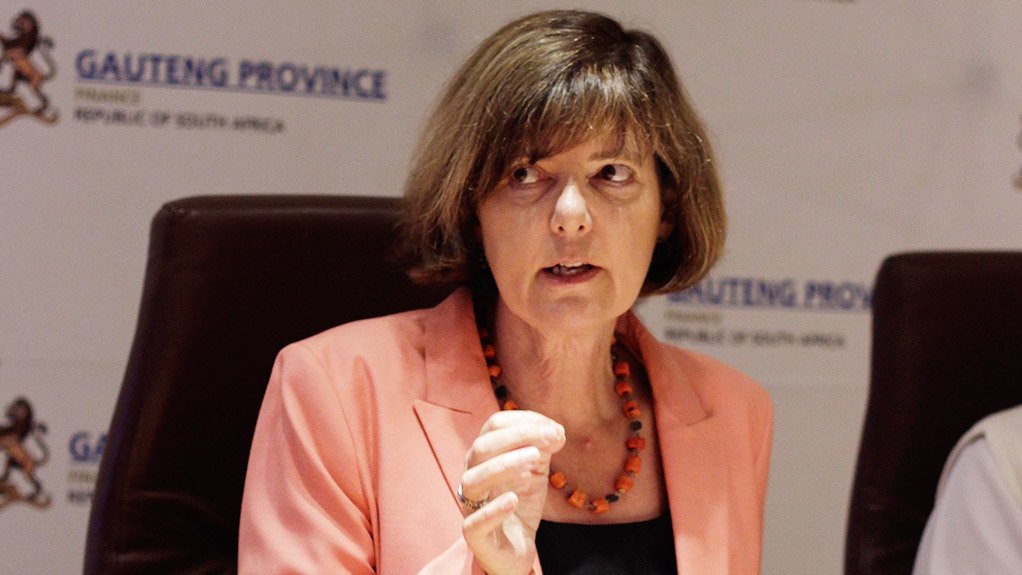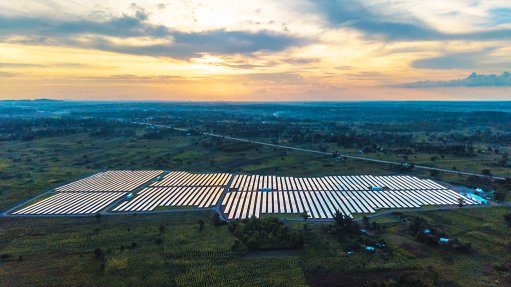Pursuit of better performance sees Gauteng split R44bn MTEF infrastructure spend
Infrastructure, health and education have taken the largest slices of Gauteng’s R108-billion provincial budget for 2017/18, which this year included the addition of R10-billion to departmental baselines.
Tabling the provincial budget in the Gauteng Legislature, in Johannesburg, on Tuesday, Finance MEC Barbara Creecy said R44.4-billion had been set aside for infrastructure spend over the 2017 Medium-Term Expenditure Framework (MTEF).
However, in a different approach, the provincial treasury has split the allocation, with R31.9-billion allocated to the baseline of the provinces’ departments and R12.5-billion ringfenced into a Gauteng Provincial Treasury housed asset financing reserve.
This spilt is aimed at “incentivising sound infrastructure planning practices”, with all projects that are “shovel ready” to be funded from department’s baseline allocations, and those that are under development but not yet “shovel ready”, to be allocated funds only from this reserve.
“Departments that present additional projects that are ready to roll in the course of the financial year, or in future financial years, will be allocated more money,” Creecy said.
She further noted that the asset financing reserve will be the source of funding for the completion of “legacy infrastructure projects” that have been outstanding for many years.
Individually, the Gauteng Treasury allocated R2.8-billion for projects in the Central Development Corridor; R1.5-billion for projects in the Eastern Development Corridor; R1.9-billion for those in the Northern Corridor; R1.3-billion for projects in the Southern Corridor; and R1.3-billion for projects in the Western Corridor.
In the Central Development Corridor, the focus will remain on housing projects, the revamp and construction of hospitals and district hospitals and the upgrade of seven schools, equipping a further five with information and communication technology capabilities.
The funds are also allocated to the Gauteng Department of Transport’s completion of the upgrade of the K46 road and the rehabilitation of Cedar road.
In the Eastern Development Corridor, housing also remains a key focus, as does education and health. New schools will be built, while others will be refurbished. R265.1-million of the Eastern Corridor’s budget will be directed towards key health projects, including the demolition of the Kempton Park Hospital.
The nearly R2-billion allocated to the Northern Corridor will see the continuation of the Gauteng Department of Human Settlements’ megaprojects, while the Gauteng departments of Roads and Transport, Health, Education, Sports, Arts, Culture and Recreation also continuing several development projects.
Besides a focus on human settlements, health and education, the Western Corridor will direct efforts towards Cooperative Governance and Traditional Affairs and Sports, Arts, Culture and Recreation projects.
The Southern Corridor is prioritising housing megaprojects as well as health, roads and transport, social development and sports, recreation, arts and culture initiatives.
“This year sees the start of the long-awaited construction of 31 mega human settlements,” Creecy pointed out, adding that a human settlement funding summit aimed at attracting investors for megaprojects would be held in early April.
The Department of e-Government has also been allocated R459-million to drive the roll-out of the broadband network and the connection of all government institutions.
For the funding of off-budget infrastructure projects, the Gauteng Infrastructure Financing Agency (Gifa) is working to “tap into alternative sources” of funding, working closely with the Gauteng Planning Division to develop a financing model for the master infrastructure plan.
The model will identify fiscal gaps to be financed off-balance sheet through public–private partnerships (PPPs).
There are around 20 projects in Gifa’s pipeline, with six new projects expected to be announced in March and a further six later this year, in addition to the Jewellery Manufacturing Precinct and the Kopanong Precinct projects, which will reach financial close in the first and second quarters, respectively, of the new financial year.
In addition, the preferred bidders to finance and implement Innovation Hub’s enterprise buildings 2 and 3, the trigeneration project for seven hospitals and the solar rooftop panel projects have been identified, with National Treasury approval now sought to conclude contractual agreements.
The province is also working with the Gautrain Management Agency and the National Treasury on a new model to fund the future expansion of the Gautrain.
Further, road infrastructure upgrades and additions will be funded through the fiscus or PPPs and not through tolling, Creecy assured Gauteng residents.
Meanwhile, Gauteng has allocated R40.8-billion towards the province’s Education Department this year, including R779-million for the transport of learners living further than 5 km from a school; R587-million for teacher development and support initiatives; R810-million for textbooks, stationary, school furniture and other learner support initiatives; and R724-million to support the continued roll-out of the e-learning strategy.
In addition, the budget for the Gauteng Department of Economic Development increased to R1.41-billion in 2017/18, to reach R1.58-billion by the end of the MTEF.
Key programmes include R16.5-million for the expansion of the Automotive Supplier Park; R52-million for the upgrading of township hubs/industrial parks and R20-million for the BioScience Park.
The Gauteng Enterprise Propeller was allocated R219-million to support 1 385 small, medium-sized and microenterprises and provide nonfinancial support for another 2 410 small businesses.
Over the MTEF, the Department of Agriculture and Rural Development has been allocated an additional R141.7-million for urban agriculture, agriparks and agrotropolis projects, as well as agroprocessing initiatives.
Gauteng is also contributing R500-million for youth development, including R110.9-million for the Tshepo 500 000 project, R19.1-million for the Expanded Public Works Programme and R295-million to provide 4 121 bursaries and scholarships to universities and technical and vocational education and training colleges.
The Gauteng Department of Health has been allocated R40.2-billion in 2017/18, the Department of Social Development R4.2-billion and the Department of Sports, Arts, Culture and Recreation R134-million.
This year’s budget, Creecy noted, had been anchored around four principles, namely, the improvement of the province’s own revenue collection to maintain and enhance provincial spending on education, healthcare and social services; sustaining improvements in public finance management to further cut waste, eliminate corruption and strengthen public accountability; the use of public procurement to transform the economic landscape and build a more inclusive and sustainable growth path; and growing Gauteng’s infrastructure spend through on- and off-budget initiatives to improve public facilities and create jobs.
Comments
Press Office
Announcements
What's On
Subscribe to improve your user experience...
Option 1 (equivalent of R125 a month):
Receive a weekly copy of Creamer Media's Engineering News & Mining Weekly magazine
(print copy for those in South Africa and e-magazine for those outside of South Africa)
Receive daily email newsletters
Access to full search results
Access archive of magazine back copies
Access to Projects in Progress
Access to ONE Research Report of your choice in PDF format
Option 2 (equivalent of R375 a month):
All benefits from Option 1
PLUS
Access to Creamer Media's Research Channel Africa for ALL Research Reports, in PDF format, on various industrial and mining sectors
including Electricity; Water; Energy Transition; Hydrogen; Roads, Rail and Ports; Coal; Gold; Platinum; Battery Metals; etc.
Already a subscriber?
Forgotten your password?
Receive weekly copy of Creamer Media's Engineering News & Mining Weekly magazine (print copy for those in South Africa and e-magazine for those outside of South Africa)
➕
Recieve daily email newsletters
➕
Access to full search results
➕
Access archive of magazine back copies
➕
Access to Projects in Progress
➕
Access to ONE Research Report of your choice in PDF format
RESEARCH CHANNEL AFRICA
R4500 (equivalent of R375 a month)
SUBSCRIBEAll benefits from Option 1
➕
Access to Creamer Media's Research Channel Africa for ALL Research Reports on various industrial and mining sectors, in PDF format, including on:
Electricity
➕
Water
➕
Energy Transition
➕
Hydrogen
➕
Roads, Rail and Ports
➕
Coal
➕
Gold
➕
Platinum
➕
Battery Metals
➕
etc.
Receive all benefits from Option 1 or Option 2 delivered to numerous people at your company
➕
Multiple User names and Passwords for simultaneous log-ins
➕
Intranet integration access to all in your organisation





















